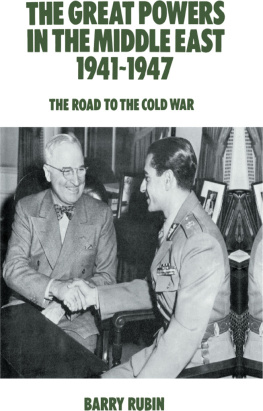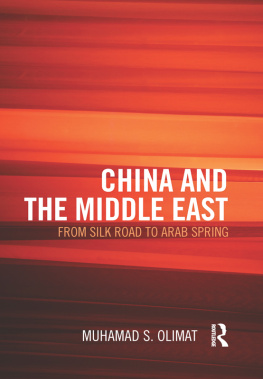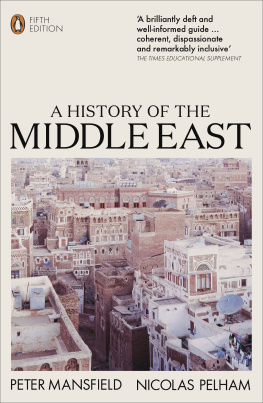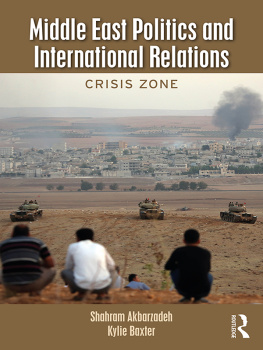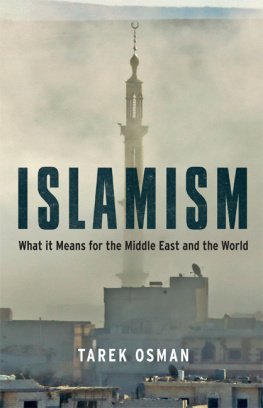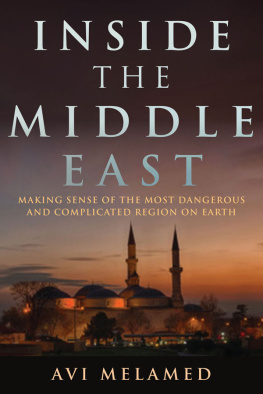Nazis, Islamists, and the Making of the Modern Middle East
Nazis, Islamists, and the Making of the Modern Middle East
BARRY RUBIN
AND
WOLFGANG G. SCHWANITZ

Archival research by Wolfgang G. Schwanitz for this book was partially made possible by the Education Fund of the Middle East Forum in Philadelphia, Pennsylvania.
Copyright 2014 by Barry Rubin and Wolfgang G. Schwanitz.
All rights reserved.
This book may not be reproduced, in whole or in part, including illustrations, in any form (beyond that copying permitted by Sections 107 and 108 of the U.S. Copyright Law and except by reviewers for the public press), without written permission from the publishers.
Yale University Press books may be purchased in quantity for educational, business, or promotional use. For information, please e-mail sales.press@yale.edu (U.S. office) or sales@yaleup.co.uk (U.K. office).
Set in Sabon type by Integrated Publishing Solutions.
Printed in the United States of America.
Library of Congress Cataloging-in-Publication Data
Rubin, Barry M.
Nazis, Islamists, and the making of the modern Middle East / Barry Rubin, Wolfgang G. Schwanitz.
pages cm.
Includes bibliographical references and index.
ISBN 978-0-300-14090-3 (hardback)
1. Middle EastForeign relationsGermany. 2. GermanyForeign relationsMiddle East. 3. National socialism and Islam. 4. World War, 19391945Participation, Muslim. 5. Middle EastHistory20th century. I. Schwanitz, Wolfgang G., 1955 II. Title.
DS63.2.G4R823 2014
327.43056dc23
2013028622
A catalogue record for this book is available from the British Library.
This paper meets the requirements of ANSI/NISO Z39.481992 (Permanence of Paper).
10 9 8 7 6 5 4 3 2 1
To the memory of relatives killed in the Shoah: Dolhinov, Poland: Haya Rubin Perlmutter and Azriel, Haim, and Yaakov Yermiyahu Perlmutter. Shmuel, Rahel Leah, Leah Rivka, Pinkas Leib, Ethel, and Moshe Grosbein. Rahel Dimenshtein and Yirimayahu and Moshe Dimenshtein. Turo, Czechoslovakia: Maria, Jozef, Artur, Ilsa, and Erika Dub
Barry Rubin
Dedicated to my parents: Margot Schwanitz and Wolfgang Schwanitz (19292013)
Wolfgang G. Schwanitz
Contents
Preface
The story of Nazi Germanys involvement in the Middle East has hitherto largely been viewed as a dramatic tale of might-have-been that was nevertheless marginal to Middle East history and the course of World War II. In fact, however, this episode was central to the modern history of the Middle East and continues to reverberate many decades later given its profound effects on Arab nationalism, Islamism, and the course taken by the Palestinian Arab movement.
The recent release by the U.S. government of massive quantities of both wartime and postwar documents coupled with the translation of previously unused German documents and Arabic-language accounts permits a much fuller telling of the story of the interactions among Arabs, Muslims, and Germans.
To understand this history requires bringing together several elements. First, there was the German strategy, beginning in the late nineteenth century, that saw Berlins interests in the Middle East as being linked to an Islamic jihad against Germanys European rivals conducted with the help of Muslim organizations.
On the other side were radical forces of nationalism and Islamism in rebellion against the regional status quo. These latter groups would become not merely Nazi Germanys protgs but its partners due to common interests and a set of parallel ideas. This was, then, neither purely an alliance of convenience nor a situation in which the Nazis were the teachers and the Middle Easterners were the pupils.
Beyond the world war itself and the collapse of Nazi Germany these events were to have long-term ramifications for Middle Eastern history going far beyond 1945. The Middle East was the only part of the world where the local allies of Nazi Germany and those holding so many of the same ideas actually emerged triumphant in the postwar world.
Again, these forces were not Nazi or fascistthey would later draw many ideas from the Communist blocbut radical nationalist and Islamist forces that held certain parallel views and at times converged and created syntheses. Their political triumphs came not so much against their external opponents but over their more moderate Arab and Muslim rivals. During the first round, despite the defeat of their European allies, these forces were able to destroy and discredit nonauthoritarian thinking and methods in the late 1940s and throughout the 1950s. Their success was so thorough that liberal democratic forcesnot uncommon in the Arabic-speaking world before the 1930sdid not again emerge as contenders for power until the first decade of the twenty-first century.
Today there is a second round in that battle. Revolutionary Islamism, one of the movements that cooperated with Imperial Germany up to 1918 and Nazi Germany up to 1945, has reemerged to challenge its former partner, militant Arab nationalism, which had crushed it in the 1950s. Once again, moderate democratic views are facing a three-way battle in which they are at a considerable disadvantage. At any rate, the ideological debates and political battles reflected in and unleashed, beginning in 2011, by the Arab Spring which, according to many observers, seemed to have turned into an Islamist Spring, can only be fully understood with reference to the earlier eras documented here.
We thank those who assisted us in granting Freedom of Information Act Requests to the U.S. National Archives for CIA records, especially the coordinator for information, Scott Koch, in Washington, D.C.; and likewise Caroline Lugato for arranging access to the Bundesnach-richtendienst collections in the German Federal Archives.
Our gratitude is due to the Global Research in International Affairs (GLORIA) Center and especially to Yeru Chernilovsky. We want to give warmest thanks to the archivists Lars Amelung, Ludwig Biewer, Birgit Kmezik, Oxana Kosenko, Martin Krger, Larry McDonald, Michael Petersen, Knut Piening, Christoph Stamm, Christiane Stegemann, Gabriele Teichmann, and Dominik Zier. We have researched private collections, among them those of Joseph W. Eaton, Hannelore Grobba, Maria Pawelke, and Manfred G. Steffen. Our thanks go to colleagues Wajih Abd as-Sadiq Atiq, Xavier Bougarel, Joel Fishman, Rainer Karlsch, Jacob M. Landau, Walter Z. Laqueur, Bernd Lemke, Astrid Ley, Jamal Malik, Sean McMeekin, Bernard Lewis, Stefan Meining, Chantal Metzger, Daniel Pipes, Wladimir J. Sacharow, Hans-Ulrich Seidt, Abd ar-Rauf Sinnu, and Matthias Uhl. And last but not least, we thank our agent Andrew Stuart; our editor, Sarah Miller and her assistant, Heather Gold; and our copy editor, Gavin Lewis, and our senior editor Margaret Otzel, for all their efforts.
Archive Abbreviations
ArchSalOppCo | Archiv Salomon Oppenheim jr. & Cie KGaA, Cologne |
ArchBStU | Archiv des Bundesbeauftragten fr die Unterlagen des MfS, Berlin |
ArhJugBG | Arhiv Jugoslavije, Belgrade |
BArchAAL | Bundesarchiv, Auswrtiges Amt, Lichterfelde |
BArchAAP | Bundesarchiv, Zentralarchiv, Auswrtiges Amt, Potsdam |
BArchBe | Bundesarchiv Lichterfelde, Berlin |
BArchPAA | Bundesarchiv Lichterfelde, Politisches Archiv, Auswrtiges Amt |
BMArchLo | Archive of the British Museum, Foreign Office, London |
Next page

